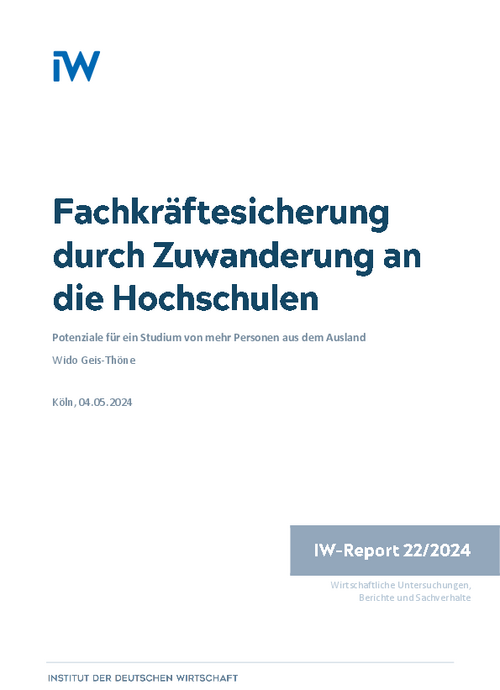Against the backdrop of demographic change, Germany is increasingly dependent on skilled labour from abroad to secure growth and prosperity.

Securing skilled workers through immigration to universities

Against the backdrop of demographic change, Germany is increasingly dependent on skilled labour from abroad to secure growth and prosperity.
At the same time, the potential of people with qualifications equivalent to a vocational or academic degree in Germany who could potentially be recruited to move here is limited. Therefore, education of people from abroad must also be strengthened, which, at least in the short term, is merely possible at universities. People who come to Germany to study, obtain an academic degree, and remain in the country for the long term are just as successful on the German labour market as university graduates from Germany. However, students from abroad are much more likely to drop out of university. Moreover, many return to their home countries after completing their studies. Nevertheless, 46 per cent of third-country nationals who came to Germany to study between 2006 and 2012 were still living in Germany ten years later, and the trend is rising.
At the same time, more and more people from abroad have been coming to Germany to study since the early 2010s. While the total number of international students with a foreign citizenship and a foreign higher education entrance qualification was around 204,600 in the winter semester 2012/2013, in the winter semester 2022/2023 it was over one and a half times as many at 367,600. The trend was particularly dynamic among Indian nationals, who now make up the largest group of international students at 42,600. In the winter semester 2020/2021, 72.9 per cent of these students planned to stay in Germany for the long term. There is still huge potential for growth in India, as the country is home to around one sixth of the world's population and continues to have a strong demographic development. Looking at the distribution by subject area, in the winter semester 2022/2023, the proportion of students with foreign nationality studying mathematics, IT, natural sciences and technology (STEM) was significantly higher at 51.4 per cent than among domestic students at 34.2 per cent. Rising by 162.3 per cent, the number of foreign students in computer science increased particularly strongly between the winter semesters 2012/2013 and 2022/2023.
As things currently stand, the STEM sector also offers particularly great potential for educating additional people from abroad, as the number of domestic students has been declining since the mid-2010s. This applies in particular to the fields of machine and process engineering as well as electrical engineering. In the coming years, the total number of unfilled study places is also expected to rise sharply, as fewer young people in Germany are gaining higher education entrance qualifications. This is due to a comparatively small domestic population of the relevant age for demographic reasons and the loss of entire A-level cohorts in the largest federal states of Bavaria and North Rhine-Westphalia due to a return from eight-year to nine-year grammar schools. With larger birth cohorts, this will change again from the mid-2030s on. For this comparatively short time horizon, a costly reduction in study place capacities would hardly be worthwhile. Instead, it makes sense to attract more people from abroad to study in the country in the meantime.

Securing skilled workers through immigration to universities

More on the topic

Pharmaceutical industry: Increasing pressure on the labor market
The shortage of skilled workers poses significant challenges for pharmaceutical companies in Germany and is expected to become increasingly problematic in the context of demographic changes. Concerning Germany's positioning in the international competition ...
IW
Immigration from Latin America: Successes and potential for securing skilled workers
Against the background of the baby boomers leaving the labour market, Germany will be increasingly dependent on skilled workers from abroad in the coming years in order to secure growth and prosperity.
IW